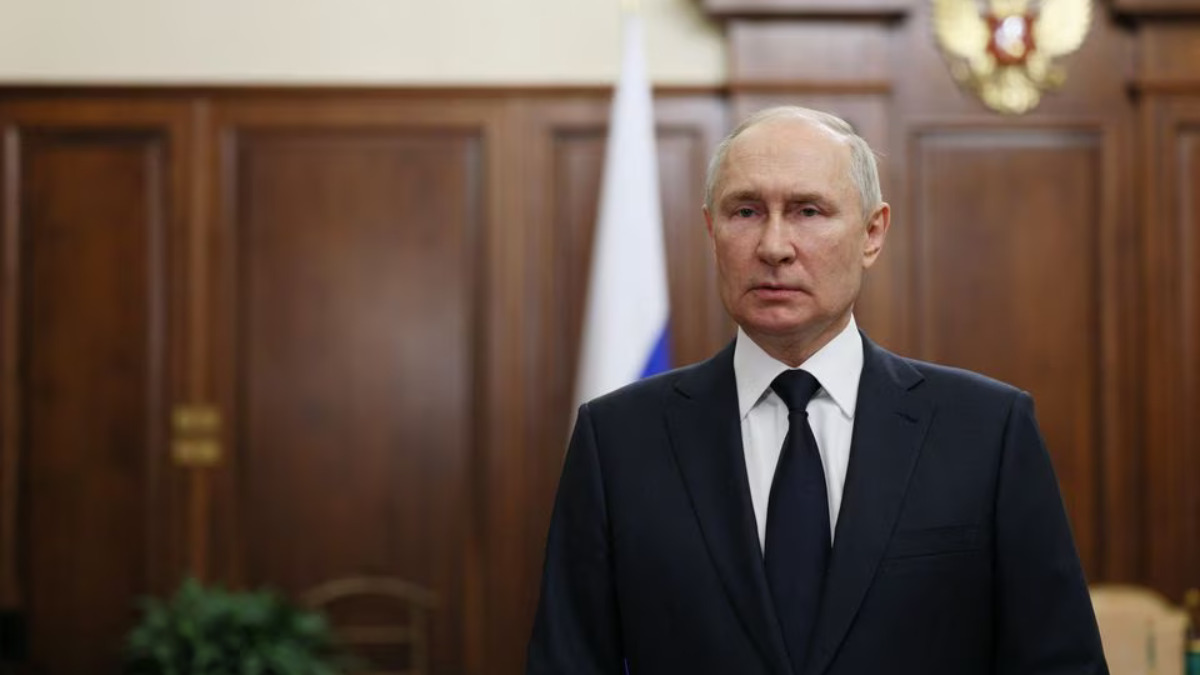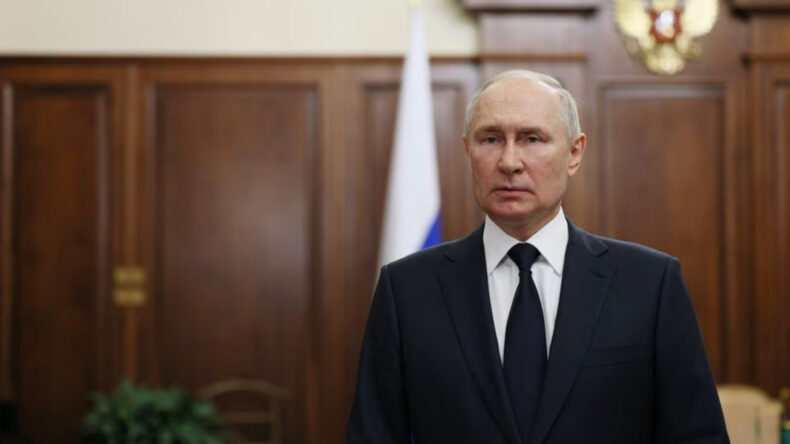In a televised address, Russian President Vladimir Putin honored the pilots who lost their lives while battling the failed mutiny led by the Wagner mercenary group in Moscow. This marked Putin’s initial public statement since the armed revolt on Saturday, led by mercenary leader Yevgeny Prigozhin, and it confirmed the reports circulating on social media that Russian aircraft were shot down by Wagner forces during the conflict.

Putin expressed that the bravery and selflessness displayed by the deceased pilot heroes played a crucial role in safeguarding Russia from severe and catastrophic outcomes. He emphasized that the mutiny posed a threat to the very existence of Russia, and he vowed that those responsible for the uprising would face appropriate consequences.
Official information regarding the number of pilots killed or the count of downed aircraft has not been released. However, several Russian Telegram channels, such as the popular blog Rybar with over a million subscribers, claimed that 13 Russian pilots lost their lives during the mutiny that lasted for a day.
According to Rybar’s report, among the aircraft that were shot down, there were three Mi-8 MTPR electronic warfare helicopters and an Il-18 aircraft along with its crew. However, it’s important to note that Reuters was unable to independently verify these reports. Additionally, the circumstances surrounding the downing of the aircraft and the loss of pilots remain unclear.
Putin stated that he personally instructed measures to be taken in order to prevent significant bloodshed during the rebellion. As a result, the Wagner forces eventually stood down, and Prigozhin agreed to exile himself in Belarus. Putin emphasized that it was necessary to allow those who had made a mistake the opportunity to reflect and understand that their actions were unequivocally rejected by society. He further highlighted that their involvement in this ill-fated venture had dire and destructive consequences for both Russia and the nation as a whole.
In an 11-minute audio message shared on his press service’s Telegram channel, Wagner leader Prigozhin provided limited information about his location or the agreement that led to the cessation of their advance towards Moscow. He claimed that his forces were compelled to shoot down helicopters that targeted them while they were en route from the southern region, covering a distance of approximately 800km (500 miles) towards the capital. However, he abruptly terminated the uprising without providing further details.
The unrest was viewed by many Western leaders as an indication of Putin’s vulnerability, particularly in light of his decision to invade Ukraine 16 months ago. Putin reiterated his commitment to fulfilling his weekend pledge, which included granting options to Wagner forces such as relocating to Belarus, entering into a contract with Russia’s Defense Ministry, or returning to their families. He expressed gratitude to the Wagner fighters and commanders who chose to stand down in order to prevent what he referred to as “fratricidal bloodshed,” and he acknowledged that the majority of Wagner members were loyal patriots.
According to a Kremlin spokesperson cited by IFX, Putin held a meeting on Monday evening with the heads of Russian security services, including Defence Minister Sergei Shoigu. It is worth noting that one of Prigozhin’s main demands was the dismissal of Shoigu and Russia’s top general, who had not made any public appearances since the mutiny by Monday evening. Prigozhin, a former ally of Putin and a convicted individual, has led forces that engaged in some of the most intense battles during the Ukraine war. He defied orders earlier this month to place his troops under the command of the Defense Ministry.
‘Struggle within Putin’s Russian system’
Prior to delivering a speech at the White House, President Joe Biden referred to the mutiny as a manifestation of an internal struggle within the Russian system. He further discussed this matter with important allies during a conference call, emphasizing the importance of preventing Putin from attributing blame to the West or NATO.
Biden emphasized that the United States had clearly communicated its non-involvement in the mutiny, stating that they had no connection to the events. The White House’s national security spokesperson, John Kirby, reiterated that the U.S. policy did not aim to alter the Russian government. As a result, foreign governments, regardless of their relationship with Russia, were left searching for information about the undisclosed details of the incident and its potential future implications.
Ukrainian President Volodymyr Zelenskiy announced in a video address delivered from a train after his visit to frontline positions that the military had achieved progress on Monday across all sectors of the front line. He referred to it as a positive day, expressing satisfaction with the advancements made.
Kyiv sees the turmoil resulting from the mutiny attempt in Russia as a potential opportunity to weaken Russian defenses. This encourages Ukraine to continue its counteroffensive operations aimed at reclaiming the occupied territory.












